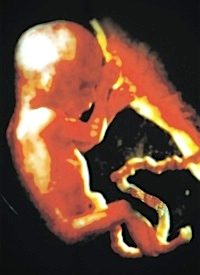
The legislatures of two more states, Oklahoma and Idaho, have voted overwhelmingly to protect the most vulnerable individuals in society: the unborn.
On April 13 the Oklahoma legislature gave its final approval to a pair of pro-life measures and sent them on to Republican Governor Mary Fallin for her expected signature.
Similar to a bill signed last week by pro-life Kansas Governor Sam Brownback, Oklahoma’s Pain-Capable Unborn Child Protection Act (H.B. 1888), as reported by LifeNews.com, “would require abortion practitioners to determine the age of an unborn child prior to an abortion and would prohibit abortions after 20 weeks — a clear point in science when unborn children have the ability to feel intense pain. The House voted 94-2 for the measure while senators sign off on the bill 38-8.”
One of the bill’s sponsors, State Senator Clark Jolley, told his fellow lawmakers that scientific research shows an unborn child can feel pain as early as 16 weeks, and said the bill before them assures that “we are not going to torture children in utero by saying we are not going to allow abortion after 20 weeks unless the mother’s life is in danger.”
Representative Pam Peterson, who sponsored the bill in the House, said during debate that because science so strongly shows that a pre-born baby is susceptible to pain, those “on both sides of the abortion debate should agree that gratuitous suffering of an unborn child is really incompatible with a decent and humane society. [This bill] shows the humanness of that unborn child.”
For those arguing that late-term abortion should be an alternative when a pre-born child has been diagnosed with a life-threatening condition, Senator Jolley pointed out that many such children have survived to live fruitful lives, but that they “will have zero chance of survival” if they are aborted.
During testimony on the bill, Tony Lauinger of Oklahomans For Life noted: “That a child in utero has been diagnosed as having an anomaly is no reason to abort the child. First of all, such diagnoses are often mistaken. And even if it’s known with certainty that an unborn baby has a disease or disability, abortion still is not justified. We are opposed to euthanasia whether the victim is an ‘imperfect’ unborn child, or a frail, elderly person whose death might be greeted with relief. Euthanizing those who are considered ‘imperfect’ or ‘burdensome’ is never acceptable.”
The second measure passed by Oklahoma’s legislators, S.B. 547, would prevent health insurance policies sold in the state from including abortion coverage. State Representative Mike Ritze, who sponsored the bill, said that “Oklahomans who believe in the sanctity of life should not be forced to indirectly subsidize the abortion industry.”
Oklahomans for Life also supported this bill, with Lauinger noting that in addition to blocking coverage for elective abortions under health-insurance plans in Oklahoma, the measure would “affirm the principle that abortion is not health care, and protect the conscience rights of pro-life premium payers so they’re not complicit in the killing.”
Meanwhile, also on April 13 Republican Idaho Governor Butch Otter signed that state’s own version of the Pain-Capable Unborn Child Protection Act, providing vital protections to pre-born babies after the 20th week. As reported by LifeNews.com, “Idaho’s Senate, led by Senator Chuck Winder, passed this historic bill by the impressive vote of 24-10. The House, led by Rep. Brent Crane and Rep. Lynn Luker, passed it by the overwhelming vote of 54-14.”
Mary Spaulding Balch, director of state legislation for the National Right to Life Committee, told LifeNews.com that abundant research “substantiates the fact that unborn children recoil from painful stimuli, experience increased stress hormones when subjected to pain, and require anesthesia when undergoing fetal surgery.” Balch commended Idaho, which joined both Nebraska and Kansas in “recognizing their compelling interest in protecting from abortion the unborn child who is capable of feeling pain.”
Photo: An unborn child at 18 weeks after conception



